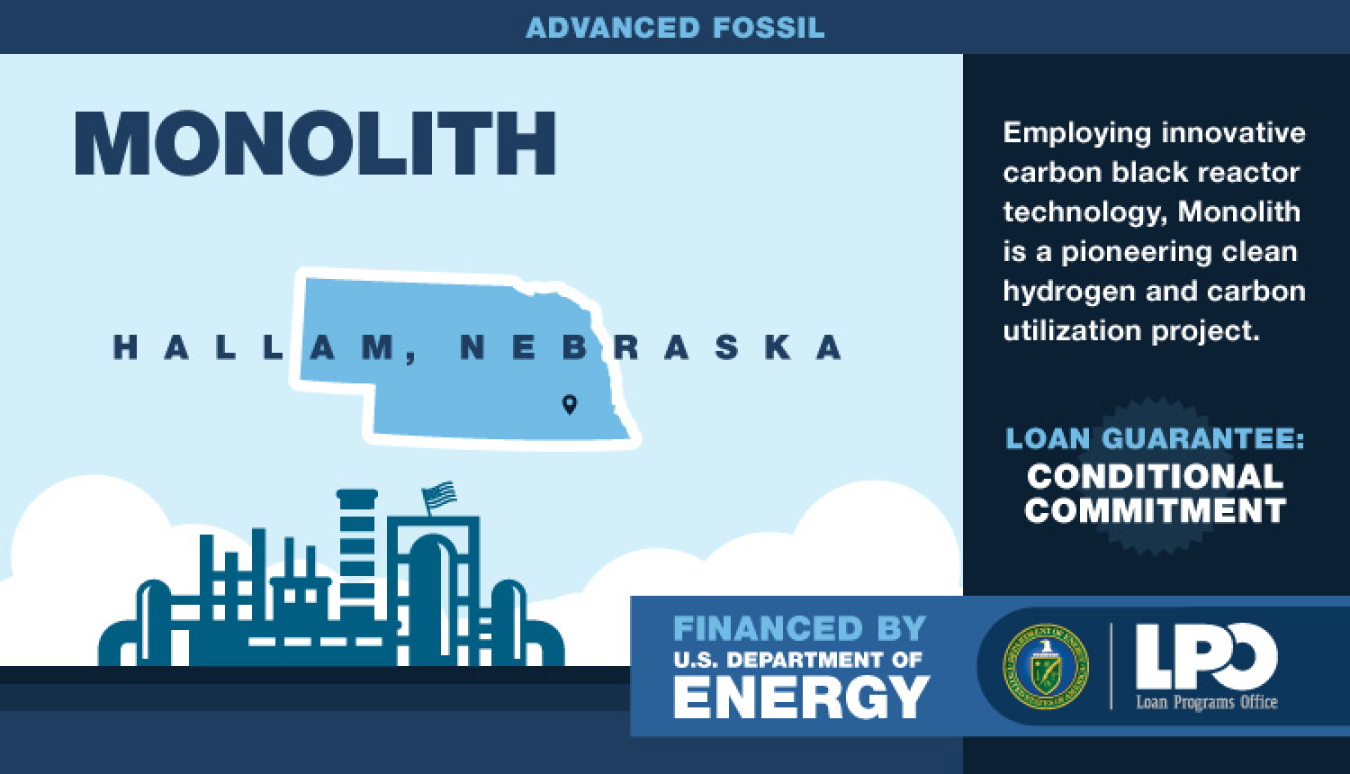
The improved U.S. Department of Energy (DOE) Loan Programs Office (LPO) is open for business and ready to build on the Bipartisan Infrastructure Law’s support for the deployment of clean energy.
LPO has made substantial changes to improve the program that has now attracted more than 66 loan and loan guarantee applications, valued at more than $53 billion in clean energy and advanced vehicle technology projects. The recently-enacted Bipartisan Infrastructure Law expanded LPO’s loan authority and broadened the pool of eligible borrowers for the program.
New Conditional Commitment for a Clean Hydrogen and Industrial Decarbonization Project
LPO has offered a conditional commitment to guarantee a loan of up to $1.04 billion to Monolith Nebraska, LLC to expand its Olive Creek facility in Hallam, Nebraska. The Monolith Olive Creek expansion will support Nebraska’s economy by creating approximately 1,000 jobs during construction and 75 high-paying, highly skilled, clean energy jobs to support facility operations. LPO works with all borrowers to create good-paying jobs with strong labor standards during construction, operations, and throughout the life of the loan and to adhere to a strong Community Benefits Plan.
While this conditional commitment demonstrates DOE’s intent to finance the project, several steps remain, and certain conditions must be satisfied before a final loan is issued. While LPO’s rigorous due diligence has resulted in a portfolio loss ratio of just 3.3% to date, to accelerate the advancement of American innovation, a mixture of successful projects and losses is expected. This is LPO’s first conditional commitment to be offered to a non-nuclear project since 2016.
The project is the first-ever commercial-scale project to deploy methane pyrolysis technology, which converts natural gas into carbon black and hydrogen — two products that are frequently used in difficult to decarbonize industrial sectors like tire and ammonia fertilizer production. Carbon black is a material that reinforces and improves the performance of tires and other rubber products, and use in the production of plastics, dyes, and inks. Currently, the conventional use of fuel oil for making carbon black emits large volumes of carbon dioxide and local air emissions.
Hydrogen produced by the Olive Creek expansion will be used for cleanly made ammonia fertilizer that can be used by the agriculture sector. Monolith’s novel technologies aim to significantly reduce the amount of greenhouse gases that are traditionally emitted during carbon black and hydrogen production by up to 80 percent compared to traditional production.
This conditional commitment signals the reemergence of LPO as DOE’s lending authority that can accelerate the development and deployment of clean energy technologies. The Monolith project can potentially catalyze a new and cleaner way of producing materials that go into a lot of our everyday products.
The Monolith project is seeking funding through LPO’s Title XVII Innovative Energy Loan Guarantee program, which was established to fill a critical role in the marketplace by financing the innovative first-of-a-kind deployments of new decarbonization technologies and bridging the gap for commercial lenders. As with all Title XVII projects, the Monolith project will also be funded by significant equity from private sources of capital.
What Others Are Saying About Monolith
“Promoting the mobility of people and goods while protecting our planet requires investments in innovative and sustainable solutions. Partnering with organizations like Monolith, with the support of the Department of Energy, is the latest example of how we intend to further accelerate toward our goal of a 100% sustainable tire by 2050 for a better life in motion,” said Alexis Garcin, chairman and president of Michelin North America, Inc.
“As the only U.S.-headquartered tire manufacturer, it’s especially rewarding to be at the connection point of significant U.S. innovation with Monolith and the commitment of the Department of Energy to sustainable outcomes,” said Richard J. Kramer, chairman, chief executive officer and president, The Goodyear Tire & Rubber Company. “We are excited to work with Monolith to reduce our carbon footprint and further our use of alternative materials as we continue to deliver industry-leading products.”
Building Momentum into 2022
These announcements reflect the work LPO has done in 2021 to update processes, solicit new projects, and conduct due diligence on potential loans in support of the Department’s work to deploy clean energy. With dozens of active applications under review, and now offering its first conditional commitment in years, LPO is poised for additional investments in 2022.

